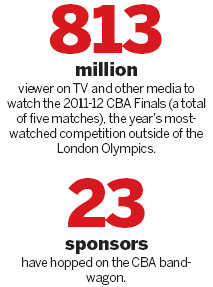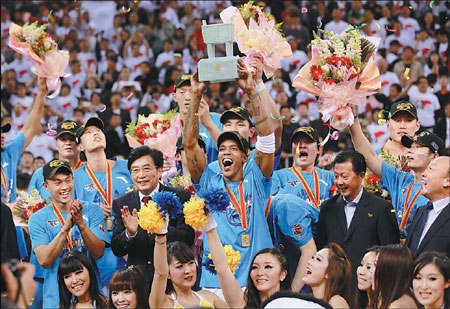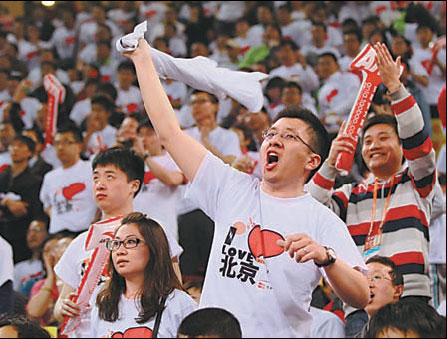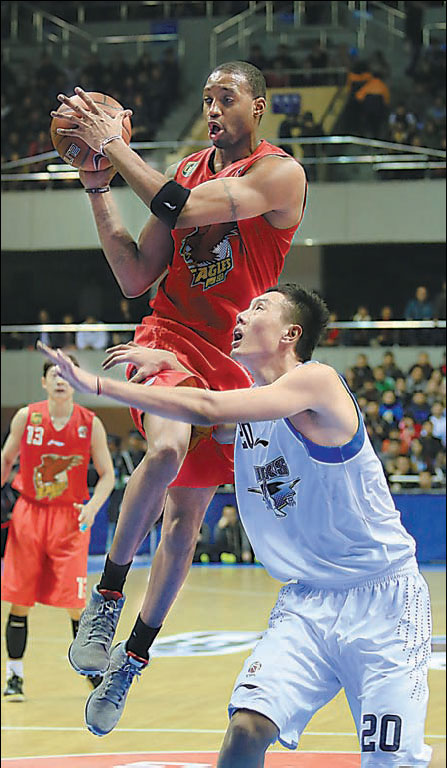Slam dunk of a year for CBA
Updated: 2013-01-06 08:30
By Sun Xiaochen(China Daily)
|
|||||||

|
Stephon Marbury holds the CBA championship trophy surrounded by teammates and officials after leading the Beijing Ducks to the 2011-12 CBA title at home on March 30. Photos by Cui Meng / China Daily |
|
Basketballl fans helped the CBA become even more prosperous in 2012. |

However, the national team's flop at the London Games is a major concern, writes Sun Xiaochen.
A flourishing domestic league usually makes for a strong national team, but not in China's basketball world. The year of 2012 saw Chinese basketball endure mixed feelings as the booming of CBA league provided a sharp contrast to Team China's dismal Olympic run in London.
Boasting high-profile former NBA players, who made the jump to earn more cash and extend their careers, the CBA has become arguably the most successful professional league in China with nationwide popularity, intensive media coverage and huge marketing potential.
It all came to a pinnacle in March when former NBA All-Star Stephon Marbury led the Beijing Ducks to their first CBA championship with a 4-1 series victory over the Guangdong Southern Tigers in the finals. The league attracted record viewership of 813 million, making it the year's most-watched competition outside of the Olympics, according to league Vice-Chairman Liu Xiaonong.
And 2012 appears to be just the beginning.
Luring even bigger names, like Tracy McGrady and Gilbert Arenas as well China's own Yi Jianlian, the new CBA season features the fiercest battle for the title yet while also drawing a record 23 sponsors, including sports goods manufacturer Li-Ning, which signed a five-year deal worth $321 million with the league.
The CBA's promotional partner, Infront China, moved on with another five-year contract worth of $270 million in September and CCTV-5 is delivering four live games plus three tape-delayed matches each week and is likely to surpass last season's total of 2,912 hours of coverage.
However, the CBA's prosperity failed to trickle through to the national team, which lost all five of its group matches at the Olympics by an average margin of 25.2 points to finish 16th and last in London.
What was most disappointing was the growing gap between China and the world's elite. Offensively, the team averaged only 9.2 assists per game, leaving Yi stranded in the paint with virtually no support, while the team allowed its rivals a 15-rebound edge (on average) in each game in London.
Not all about Bob
Most criticism was aimed at head coach Bob Donewald, of the US, who ended his tumultuous tenure after the Games, but it is unlikely any other coach would have made much more of a difference.
The talent pool is threadbare, particularly at the point - besides 32-year-old Liu Wei, who has run the team at the past three Olympics.
While a promising post players is emerging in the giant form of Wang Zhelin, and he has already been labeled the next Yao Ming, a younger Liu hasn't appeared.
Guangdong's 23-year-old Chen Jianghua and Liaoning teenager Guo Ailun are both still too inexperienced to control the tempo of an international game.
Few forwards were capable of consistently knocking down open shots and the Guangdong duo of Zhu Fangyu and Wang Shipeng are starting to show their age.
"I don't think anybody could do a better job than we did. I thought we just did the best that could be done in this era," Donewald said after his last game with China in London.
Is league hurting the nation?
The foreigner-reliant CBA should take some responsibility for the parlous state of the national program.
Just check each CBA statistics category and see how many Chinese names you can find among the top three.
The CBA's 17 teams have imported 36 foreign players including 28 NBA veterans - this season, and most of them play decent minutes in key roles while domestic youngsters watch from the bench.
The case of Marbury, who is committed to helping his Chinese teammates improve, is rare among the growing foreign legion.
Liu Peng, dirctor of China's State General Administration of Sport, warned the governing body to be aware of the decline of the China team and urged measures be put in place to reform the league and optimize training programs.
"One of the most important goals in operating the league is to improve the local players' levels while building up reserves for the national squad," Xiao Tian, deputy director of the sports administration, said at the recent annual sports officials' meeting. "Otherwise, we'd better reconsider this apparent boom in the league."
Who's next for the NBA?
Unlike other juniors who are struggling to earn minutes in their rookie year, Fujian's 18-year-old center Wang has already shouldered a heavy workload in his debut season.
Averaging 19.3 points and 11.5 rebounds in his first 15 games, the 2.14-meter Wang hasn't let the high expectations of him trouble his game.
"Ultimately, that (the NBA) has to be the goal," said Fujian's head coach, Tab Baldwin, who boasts international experience with the New Zealand, Lebanon and Jordan national squads. "But he has a lot more to learn. He's 18 and plays the game like maybe he's 21, but that's not enough. That learning process will take place in the CBA, at summer workouts and in international games."
Another NBA prospect is Li Muhao, 20, who has already drawn attention from NBA's Memphis Grizzlies owner Robert Perra. Yet the long, thin (2.16m and 90kg) center still needs to improve his physical and mental strength in his second CBA season.
"Improved performances from the younger generation are definitely anticipated this year," Liu said. "Their growth is the key to our national team making breakthroughs at the 2016 Rio Olympic Games."
|
Tracy McGrady (top) is the highest-profile player in the CBA this season. |
(China Daily 01/06/2013 page8)


